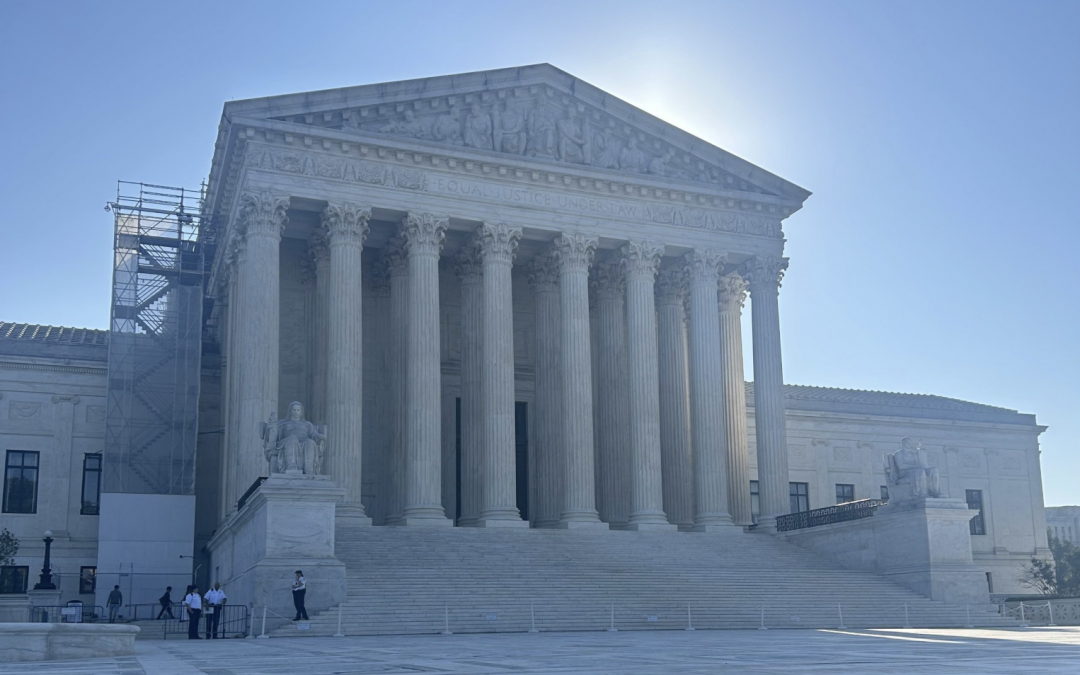WASHINGTON – The Supreme Court expressed skepticism of a key provision of the Voting Rights Act during oral arguments Wednesday, setting the stage for a decision that could prompt sweeping redistricting efforts across the country.
The landmark case, Louisiana v. Callais, centers on Section Two of the Voting Rights Act, which prohibits states from enacting voting rules that have a discriminatory effect on minority groups, regardless of intent.
“This case could throw congressional maps across the country into chaos,” NAACP Legal Defense Fund President and Director-Counsel Janai Nelson said during oral arguments.
For decades, courts have ordered state legislatures to draw some majority-minority congressional districts to ensure that minority voters — especially Black voters in the South — can elect representatives of their choosing.
On Wednesday, however, the Supreme Court’s six-justice conservative bloc indicated they may be prepared to prohibit states from considering race in redistricting by weakening or overturning Section Two.
One mechanism by which the Court could modify this statute is imposing a durational limit, a concept invoked to strike down continuing affirmative action policies in the landmark Students for Fair Admission v. Harvard case two years ago.
Justice Brett Kavanaugh, who could be the deciding vote in this case, raised the prospect of a time limit and questioned whether its implementation should be deferred to Congress.
“This Court’s cases in a variety of contexts have said that race-based remedies are permissible for a period of time, sometimes for a long period of time — decades in some cases — but that they should not be indefinite and should have an end point,” Kavanaugh said.
The three liberal justices repeated multiple times that legal precedent is on their side and focused on the successes of the Voting Rights Act in protecting minority groups.
Justice Sonia Sotomayor argued that racial minorities tend to vote together, so many states continue to draw districts with racial considerations.
“Race is a part of redistricting always … And my colleagues are trying to tease it out in this intellectual way that doesn’t deal with the fact that race is used to help people,” Sotomayor said.
In 2022, Louisiana enacted a new congressional map containing six districts. Just one district was majority-Black, even though about 33% of the state’s population was Black, according to census data. A group of Black voters sued, claiming the map violated Section Two by diluting their voting power.
After a district court and the Fifth Circuit Court of Appeals ruled in the plaintiffs’ favor, the state passed a new map in 2024, drawing a second majority-Black district stretching from Baton Rouge to Shreveport.
The legislature initially supported this map primarily to maintain control in drawing congressional boundaries and prevent a federal court from imposing its own map.
A group of voters describing themselves as “non-African American,” including Phillip Callais, filed a second lawsuit, alleging that the new map was racially gerrymandered. Specifically, they argued that the map violated the 14th Amendment’s Equal Protection Clause because race was the primary factor in its new boundaries.
A three-judge panel agreed with Callais, ruling that the new map containing the second majority-Black district was an unconstitutional racial gerrymander. The Supreme Court allowed the state to temporarily use the new map in the 2024 elections.
Upon reargument of the case before the Supreme Court, Louisiana reversed its position, leaving Nelson of the NAACP Legal Defense Fund as the sole attorney to defend the existing map.
She argued that Louisiana is “emblematic of the ongoing need for Section Two,” citing legal precedent on eliminating racial discrimination in electoral processes.

Following oral arguments, NAACP Legal Defense Fund President and Director-Counsel Janai Nelson addressed a group of protesters supporting the new map. (Riddhimaa Kodali/MNS)
In Allen v. Milligan (2023), the Supreme Court ruled that race-based redistricting can be required when necessary to remedy a map that dilutes minority voting power.
J. Benjamin Aguiñaga, Louisiana’s solicitor general, argued on behalf of the state that the Milligan decision left undecided whether Section Two itself is constitutional.
“The question before the Court is simple but momentous: Can Congress compel a state to engage in racial sorting to avoid liability under Section Two?” Aguiñaga asked. “The answer must be no.”
Prominent liberal and conservative groups have lined up to file competing amicus briefs ahead of the Court’s decision, which is expected to arrive by next summer.
David Gans, director of the Human Rights, Civil Rights and Citizenship Program at the Constitutional Accountability Center, said that Congress has the power to enact laws offering additional protections that go further than the 15th Amendment — an argument that Nelson offered to the court.
The Public Interest Legal Foundation, a conservative legal group focused on election integrity, filed a brief arguing that Louisiana’s new map used race as a predominant factor and violated the 15th Amendment.
“The lawmakers have openly said that their mission was to create two majority-Black districts,” said Douglas Blair, communications director for the Public Interest Legal Foundation.
Other groups disagreed, countering that the Supreme Court has historically allowed states to consider race to comply with the Voting Rights Act.
“Without Section Two, you’re just going to have a situation where people are going to be able to engage in the performative act of voting — going to the polls, casting a ballot — but the effect of your vote is going to be profoundly diluted if you happen to be Black in certain parts of the country,” said Avner Shapiro, a senior supervising attorney for democracy and voting rights at the Southern Poverty Law Center, which also filed a brief.
Nelson shared a similar warning in her closing rebuttal argument on behalf of the Black voters.
“Any further neutering of Section Two would resurrect the 15th Amendment as a mere parchment promise,” she said.


